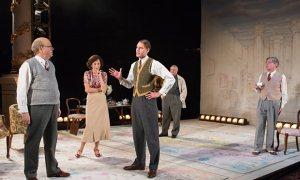The Moderate Soprano
Note: This is a review of the original Hampstead production. The Moderate Soprano is transferring to the West End in 2018.
Theatre actors, directors and writers alike may go wherever work takes them, but there's nothing more delightful when they alight upon a theatrical home, like Simon Russell Beale or Alex Jennings enjoyed at the National, for instance, under the last artistic director Nicholas Hytner. Playwright David Hare was virtually the house dramatist there during Richard Eyre's tenure, much as Patrick Marber already is for Rufus Norris (on some nights over the summer, his work was represented on each of the National's three main stages).
Now David Hare has gone full circle back to his first theatre home — it was at Hampstead in 1970 that he made his debut with Slag, which was followed by two more plays; and he returns there now, over four decades later, with a new play that tells the true story of the making of an operatic home — the private opera house called Glyndebourne on a country estate in East Sussex in 1934 that has become a globally known and still-thriving summer institution.
It's a gift of a story about not just the pursuit of private passions made public, but also a delicate love story about an eccentric bachelor landowner John Christie who finds love, late in the day with a younger opera singer Audrey Mildmay — the moderate soprano of the title — and makes her the star of his project. Hare fleshes it out with appearances by Glyndebourne's first musical and artistic directors, Dr Fritz Bushl and Professor Carl Ebert, respectively, as well as producer Rudolf Bing (who would later run New York's Met). Christie's ambitions to indulge his passion for Wagner and turn Glyndebourne into an English Bayreuth are thwarted by the people he employs, who prefer Mozart.
As often with Hare, it becomes a framework for lots of talk about the transporting power of art without being quite transporting itself. But if The Moderate Soprano is only a moderately diverting play, it is given an exceptional staging that hits the high notes thanks to director Jeremy Herrin, who orchestrates it with fine feeling and elicits beautiful performances.
A truly transformed Roger Allam — one of our finest and most versatile actors — stuns as Christie; barely recognisable with a nearly bald pate, his is a portrait of a particular kind of English eccentricity that rings utterly true. He is perfectly partnered, in every sense, by Nancy Carroll's luminous yet fragile Audrey; and there's superb support from Paul Jesson's Busch, Nick Sampson's Ebert and George Taylor's Bing.
"Roger Allam delivers this with spine-tingling magnificence and throughout captures Christie's extraordinary mix of obduracy, uxoriousness and visionary zeal."
Michael Billington for The Guardian
"Sensitively directed by Jeremy Herrin and stylishly designed by Rae Smith to combine a suggestion of the wings of Glyndebourne's stage...But in terms of drama it's too much strudel, not enough schnitzel."
Dominic Cavendish for The Telegraph
"Roger Allam delivers a stunning performance - killingly funny and achingly sad - as the founder of this Sussex country house Mozartian Mecca."
Paul Taylor for The Independent
External links to full reviews from popular press
Guardian - Telegraph - Independent
Originally published on
